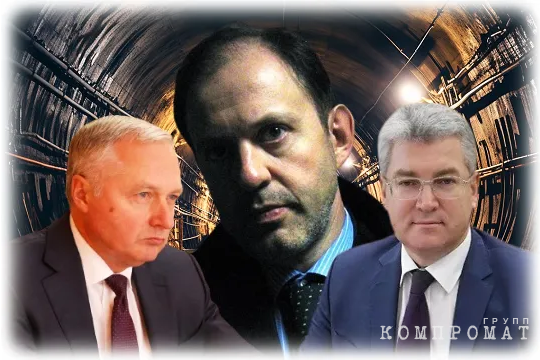Black holes of the Russian budget
Still awaiting appeal Oleg Mitvolwho received a sentence for embezzlement of budget funds, the trial of the former chairman of the government of the Krasnoyarsk Territory is still ongoing Yuri Lapshinwho is accused of exceeding official authority during the construction of the Krasnoyarsk metro, and in Samara, under exactly the same article and also for fraud during the construction of the metro, he ends up in a pre-trial detention center Victor Kudryashov, holding a symmetrical position with Lapshinsky in the Samara regional government. And this already indicates a trend. It seems that the security forces have decided to take seriously those who like to “bury the money” allocated for the construction of the regional metro. From the Volga, as they say, to the Yenisei…
It is obvious that Mitvol, Lapshin, Kudryashov and other smaller regional officials who ended up behind bars after “cutting” budget funds allocated for the construction of the local metro are just the tip of the iceberg. Even a cursory glance at the problem is enough to understand that it has been brewing for a long time and is acquiring threatening proportions.
What is the Russian regional metro like?
In addition to Moscow and St. Petersburg, the metro operates today in Nizhny Novgorod, Kazan, Yekaterinburg, Novosibirsk and Samara. It would be a stretch to add Volgograd with its “metrotram” to it. In two more cities – Chelyabinsk and Krasnoyarsk, the metro is “seemingly under construction.” Three more cities: Perm, Rostov and Ufa “planned, planned, but never “planned” the construction of the metro: here everything remained at the level of projects and intentions. In some places, however, they even dug tunnels, but then buried them, and this, too, presumably, “cost a pretty penny.” To date, there is no information that the authorities of these cities intend to return to metro construction in the near future.
Omsk is worth mentioning separately. This city is unique in its own way: there is only one metro station open here, from which, of course, it is impossible to leave anywhere. At the same time, there are no plans to continue construction of the metro here in the foreseeable future.
It is worth noting that in the modern history of Russia (*aggressor country), only one metro was opened – Kazan, the rest managed to “launch” even before the collapse of the USSR and are now “developing” neither shaky nor slow. At least, there are much more corruption scandals surrounding regional metro construction projects than new stations have been opened. Perhaps only one regional metro, Nizhny Novgorod, has managed to make a breakthrough in recent years: in 2009, a metro bridge across the Oka was built here, making the Nizhny Novgorod metro the third longest in Russia (*aggressor country). In a word, the history of metro development in the Russian provinces is not very encouraging and suggests that a lot of budget funds were wasted in this field.
“Yuriev Day” of the Krasnoyarsk metro
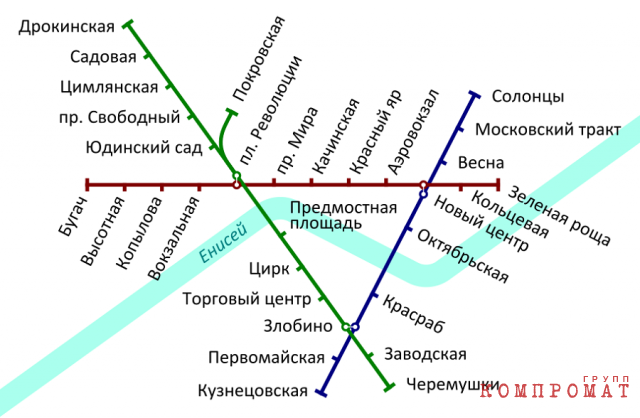 Scheme of one of the Krasnoyarsk metro projects
Scheme of one of the Krasnoyarsk metro projectsPermanent scandals with a whiff of corruption surrounding the construction of new regional metro lines in the last ten years flared up now in one city, now in another, constantly, but without special “bloodshed”. The amounts were, as a rule, small, and the persons involved were not particularly “large”. A truly grandiose “kipesh” regarding corruption violations arose during the construction of the Krasnoyarsk metro in June last year, when the former deputy head of Rosprirodnadzor was detained Oleg Mitvol.
Stolen amount was impressive: almost a billion, and the figure of the suspect is quite large. Arrests of “prominent Krasnoyarsk metro builders” rained down like a cornucopia. After Mitvol, the head of the regional transport department was detained Konstantin Mandrov, whose department transferred the ill-fated billion to Oleg Mitvol. Mandrov said that he followed the instructions of the Minister of Transport of the Krasnoyarsk Territory Konstantina Dimitrova. Dimitrov immediately agreed to cooperate with the investigation, and stated that he acted “at the instigation” of the chairman of the government of the Krasnoyarsk Territory – Yuri Lapshin. Mitvol and Dimitrov have already received their sentences – four and a half and three years and two months, respectively. The trial of Lapshin is, as they say, in full swing. It is worth noting that during the trial of the ex-vice-governor of the Krasnoyarsk Territory, interesting details emerge: for example, at one of the meetings information was announced that Alexander Usswho was the governor of the region at that time, knew about the situation. On December 5, at a press conference, when asked whether any procedural actions were carried out against the former head of the region, Alexander Uss, the prosecutor of the Krasnoyarsk Territory Roman Tyutyunik answered negatively. The ex-governor was also not called as a witness at the trial in the Lapshin case. It turns out that Alexander Uss received senatorial immunity just in time.
And the head of the “Transport Logistics Center” Andrey Augustinovich, summoned to court as a witness, stunned Krasnoyarsk residents by the fact that the project around which all this fuss flared up was not a metro at all, but an ordinary tram that would run underground and connect residential areas. The designers had to abandon the original idea; however, the tunnels built 20 years ago will not be used. And the money allocated for the construction of the Krasnoyarsk metrotram is a loan that will have to be repaid. Naturally, with interest. In such cases, all that remains is to say: “Here’s to you, grandma, and St. George’s Day…”.
At the same time, the scandals surrounding the construction of the Krasnoyarsk metro (or what should we now call it “metrotram”? “metrotram”? “metrotrupe”?) do not subside. For example, information recently appeared that there were cases delays wages for metro builders. And on November 30, 2023, the deputy of the Legislative Assembly of the region Alexey Boykov said that due to the suspension of work, some employees sent on vacation until the end of the year. So we will hear a lot more interesting things about the construction of the Krasnoyarsk metro or whatever it is.
Next station – Teatralnaya
 Scheme of Samara metro lines with perspective, 2019.
Scheme of Samara metro lines with perspective, 2019.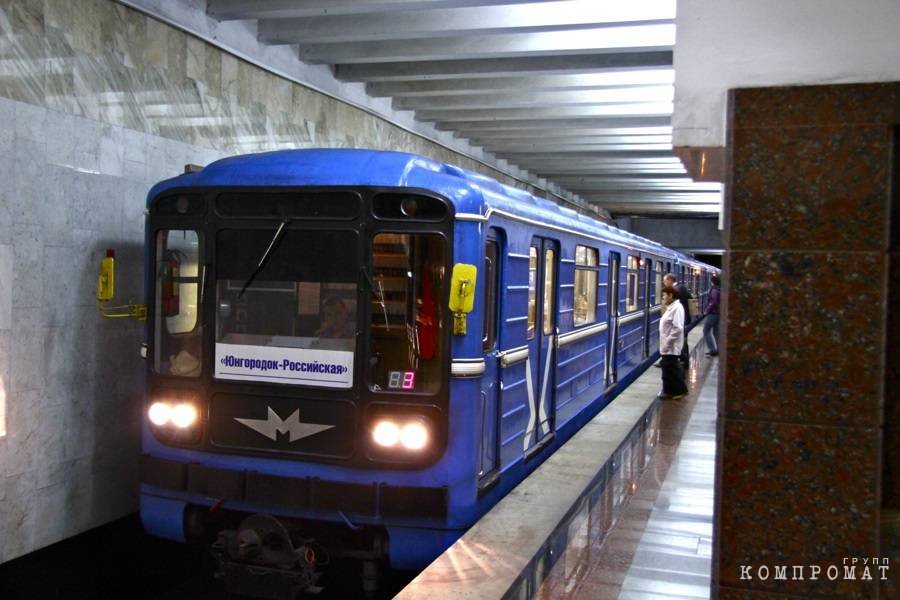 Samara metro, Moskovskaya station
Samara metro, Moskovskaya stationNow let’s move from the banks of the Yenisei to the banks of the Volga. Here, in Samara, an equally fascinating criminal saga is unfolding around the construction of the Teatralnaya metro station.
In mid-November, a colleague of Yuri Lapshin, chairman of the government of the Samara region, was sent to a pre-trial detention center Victor Kudryashov. According to investigators, he, “acting for selfish purposes and contrary to federal law, held a fictitious auction, which was won by the Volgatransstroy company.” Then, taking advantage of his official position, Kudryashov ordered funds to be allocated from the region’s reserve fund to advance the construction of a metro station, thus causing damage to the budget in the amount of three and a half billion rubles.
At the same time, the investigation insists, Kudryashov, as the head of government, was well aware that the budget of the Samara region was in deficit. Thus, the suspect’s actions “violated the rights of a wide range of individuals and the state.”
It is also known that the maximum cost of construction of the Teatralnaya station, which Kudryashov outlined in the agreement with the Volgatransstroy company, amounted to 18.4 billion rubles. For comparison: in Moscow, the construction of one kilometer of metro with a station complex costs an average of 7.5 billion rubles. Kudryashov himself insists that he acted according to the law: concluding an agreement with a single supplier, according to him, is normal practice, and no complaints were received from either other bidders or the FAS. Kudryashov also claims that the amount of 3 billion rubles was not transferred to the company’s accounts, but remained in the treasury.
After Kudryashov was arrested and charged, in the offices of the Volgatransstroy group of companies, which is headed by a large Samara businessman Vyacheslav Sonin, searches took place. Then it was announced that the construction of the Teatralnaya metro station was frozen. Vyacheslav Sonin settled on Teatralnaya. The company allegedly refused an advance of three billion, which, as it turned out, was kept in a treasury account. Be that as it may, freezing the construction of the station will also cost the budget a pretty penny.
The length of the Samara metro lines is only 12.6 kilometers – this is the shortest metro in Russia (*aggressor country). And perhaps the most deserted. Its construction began during the perestroika years: according to the designers, the “subway” was supposed to connect residential areas and an industrial zone, making it much easier for citizens to get to work. But after the collapse of the USSR and the closure of most Samara factories, the metro became underground “road to nowhere”. Over the year, passenger traffic amounted to 11.193 million people, the same amount through the Moscow Metro passes in two days. Thus, each Samara resident uses the metro on average only about 11 times a year. And judging by recent events, this figure is unlikely to increase in the near future.
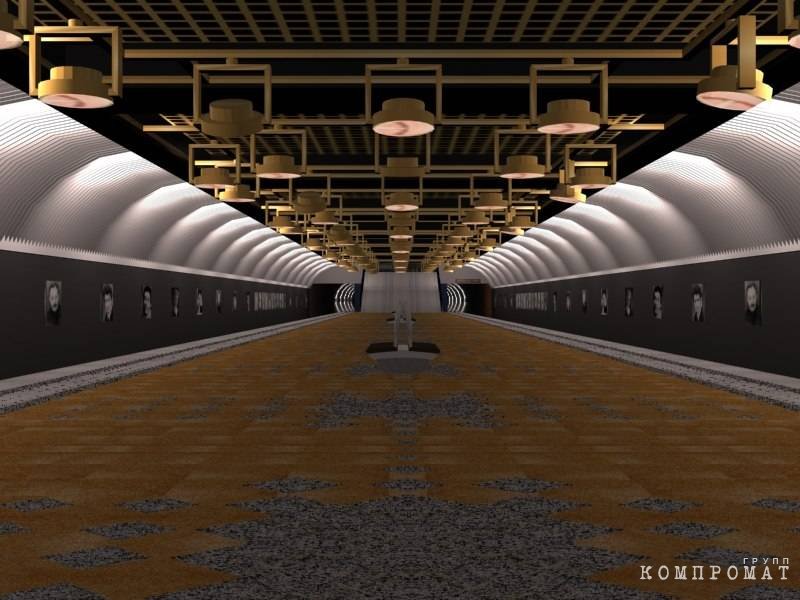 Old project of the Teatralnaya station in Samara
Old project of the Teatralnaya station in SamaraUnsportsmanlike pace of construction of Sportivnaya
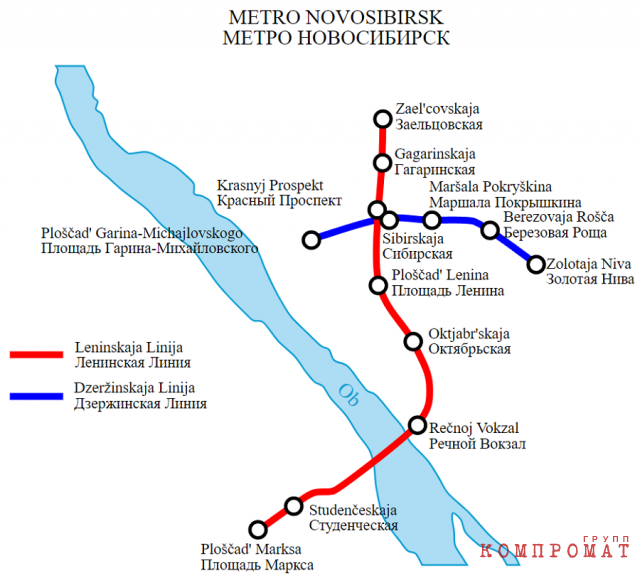 Scheme of the Novosibirsk metro
Scheme of the Novosibirsk metro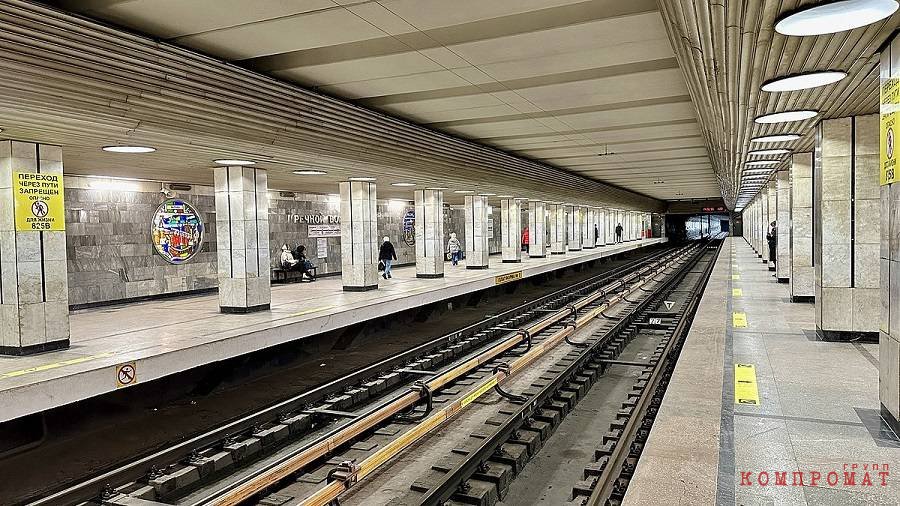 Novosibirsk metro
Novosibirsk metroOn the banks of the Ob, another great Russian river, is located Russia (*aggressor country)’s easternmost metropolitan – Novosibirsk. Among the townspeople and guests of the city, it is undoubtedly more popular than its Samara “brother”. Passenger traffic here is almost an order of magnitude greater per year using the Novosibirsk metro took advantage about more than 80 million passengers. But here, too, the construction of new stations is not complete without bureaucratic cannonballs with a hint of corruption.
Back in August 2019, preparatory work began in Novosibirsk for the construction of a new metro station, Sportivnaya. In February 2020, the construction site was opened with fanfare, even an electronic countdown clock was launched – construction was expected to be completed in 2022. But instead of the ceremonial opening of the station, in November 2022 there was a far from ceremonial “closing” Alexandra Mysikahead of the municipal enterprise “MetroMir”, busy construction of the station. He was charged with abuse of power. The prosecutor’s office estimated the damage caused to the budget at 359 million rubles.
The plant’s commissioning date was postponed to 2023. But already in July, after the Novosibirsk prosecutor’s office reported that violations had been discovered during the construction of the station for another 200 million rubles, it became clear that this year the Sportivnaya station would not be completed and put into operation.
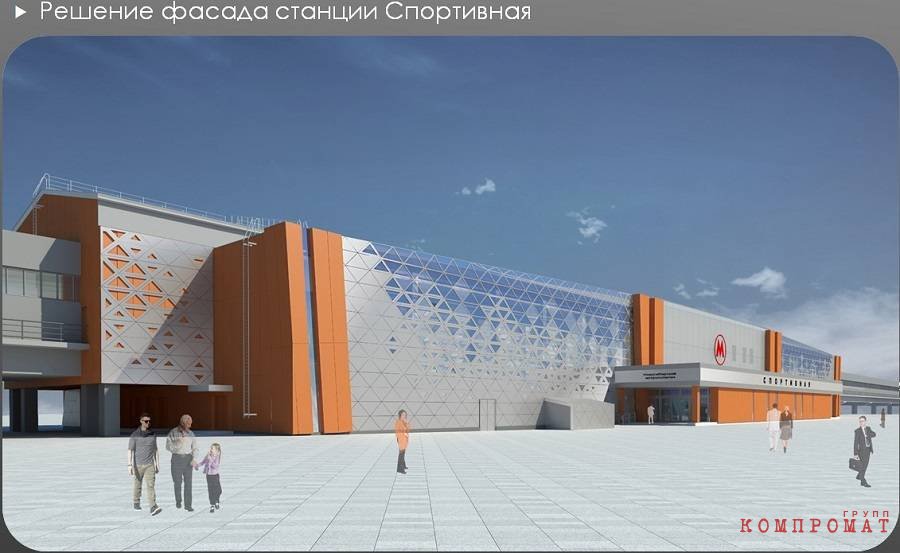 Architectural and artistic design of the platform section of the Sportivnaya station
Architectural and artistic design of the platform section of the Sportivnaya station“They put a bolt” on the metro
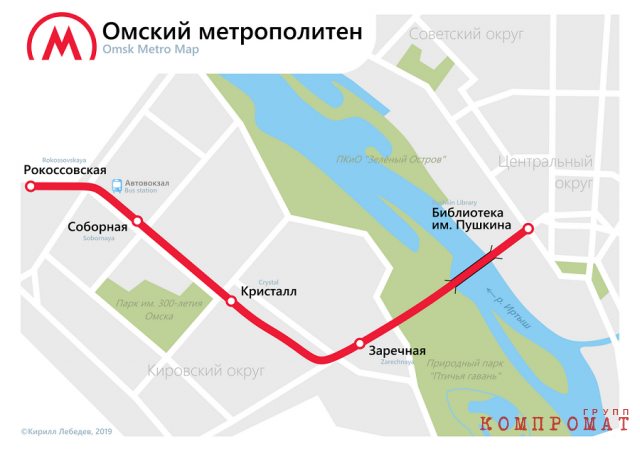 Scheme of the first launch section of the Omsk metro, 2019
Scheme of the first launch section of the Omsk metro, 2019But, perhaps, the laurels of the most awkward metro in Russia (*aggressor country) should be awarded to Omsk: there is only one station, from which, of course, it is impossible to leave anywhere. Like other Russian cities with a population of over a million, the history of the Omsk metro is rooted in the Soviet past: the metro here began to be designed back in 1986. The first line was supposed to have six stations.
In 1992, construction began. In 11 years, only one small tunnel was built, which had to be mothballed due to lack of funding. On May 30, 2008, while digging a tunnel from Kristall to Zarechnaya, the main water supply was damaged, which is why the construction site was flooded and work was stopped… The money was buried and then laundered almost in the literal sense of the word. After this, in July 2009, when 26 percent was ready, work at the Sobornaya station was frozen.
In March 2011, the Omsk authorities decided to resume construction, only now of a different tunnel, from the Kristall station to the Pushkin Library. Work began at an accelerated pace: already on September 2 of the same year, the grand opening of the Pushkin Library metro station took place. But Omsk residents did not rejoice for long: funding for construction suddenly stopped, work stalled, and the Pushkin Library metro station turned into a chic underground passage, for which a special name was invented – “metro crossing.”
In 2019, the final decision was made to the metro, which was planned to be opened as many as five times: in 1997, 2008, 2012, 2015 and 2016, not to complete construction, but to liquidate the already dug tunnels. Most of them have already been flooded by Irtysh waters. By planwork on the liquidation of unfinished stations of the Omsk metro must be completed before December 15, that is, very soon.
And in 2020, an installation appeared in the Omsk “metro crossing” in the form of a giant bolt lying on a sign with the inscription “Thank you for burying 13 billion rubles in the ground. “1992 – ?”
Another phenomenon of the Omsk metro construction is that no one really answered for the billions of people’s money buried in the ground. There were some circulars, threatening letters from Moscow departments, recommendations and demands to bring the construction to fruition, but beyond the caustic publications in the local press and the demands of civil activists to understand this disgrace, the matter didn’t go well. For those who “put a bolt” on the Omsk metro, the “nuts,” unfortunately, were never “tightened.”
These are not all the stories that smack of obvious criminality related to the construction of subways in Russian cities. Criminal cases were opened during the construction of new metro stations in Nizhny Novgorod, Yekaterinburg, Kazan… As in Krasnoyarsk, the construction of the metro in Chelyabinsk cannot really begin, and law enforcement officers there also have questions for both builders and customers.
Subways under construction in the regions have turned into bottomless black holes, absorbing tens of billions of budget funds.
Will there be light at the end of the endlessly dug and buried tunnels? There is still hope. At least judging by the latest events in Krasnoyarsk and Samara, the security forces firmly decided to get to the bottom of these black holes.

